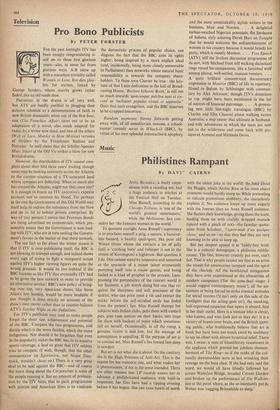Music
Philistines Rampant
By DAVI'''. CAIRNS ANNA RUSSELL, a beefy come- dienne with a receding wit, had a huge audience in stitches at the Festival Hall on Tuesday. Miss Russell, according to the Chicago Tribune, is 'one of the world's greatest entertainers,' while the Melbourne Sun con- siders her 'the funniest woman in the world.'
To question outright Anna Russell's supremacy is to proclaim oneself a prig, a square, a humour- less bastard, a beastly spoil-sport, like poor old Wotan (from whom she extracts a lot of jolly fun), a `crashing bore' and (whisper it not in the streets of Kensington) a highbrow. But question it I do. One cannot stand by impassive and unmoved at the spectacle of a minor talent strenuously pumping itself, into a major genius, and being hailed as a kind of prophet in the process. Lam- pooning the pomposities of the concert world is her business, a job worth doing but one that re- quires the sharpness and soft precision of the satirist, who can prise open a rib and extract the micky before the self-satisfied smile has faded from the patient's lips. Miss Russell thumps her subjects with Indian clubs, pelts them with custard pies, pins rude notices on their backs, sets traps for them with buckets of water which sometimes fall on herself. Occasionally, in all the romp, a genuine victim is laid f ow, but the wastage of ammunition is appalling. If the purpose of art is to conceal art, Miss Russell's lies buried feet deep in sawdust.
But art is not what she is about. On the contrary she is the High Priestess of Anti-Art. This is the reason for her meteoric rise, and what makes her a 'phenomenon,' if not in the sense intended. There are other reasons too. LP records assure her in advance a prefabricated audience with built-in responses; her fans have had a ripping evening before it has begun. She can raise howls of mirth with the oldest joke in the world; the Joke about the Haggis, which Archie Rice in his most abject moments would hardly stoop to. While pretending to ridicule pretentious snobbery, she shamelessly exploits it. No audience keeps up more eagerly with the Joneses than an Anna Russell audience. She flatters their knowledge, giving them the scent, leading them on with craftily dropped morsels (spiced with a pinch of sex)—the familiar quota- tions from Schubert, Taprs-tnidi d'un quelque chose,' and so on—so that they feel they are very knowing to be able to keep up.
But her deepest appeal is at Teddy-boy level. She is a cultural demagogue, a philistine rabble- rouser. The line, however crudely put over, can't fail. That is why people cannot see that as an artist she stands for amateurism rampant and the spirit of the charade. All the bewildered antagonism they have ever experienced at the obscurities of modern composers ('for the tone-deaf singer I would suggest contemporary music'), all the un- easiness at being forced to strike musical attitudes for social reasons ('it isn't only on this side of the footlights that the acting goes on'), the sneaking, half-repressed suspicion that opera is absurd, find in her their outlet. Here is a woman who is clever, who knows, and who feels just as they do! It is a victory of brawn over brain, and the British sport- ing public, who traditionally believe that art is bunk but have been too much awed by snobbery to say so, cheer with almost hysterical relief. There was, I swear, a note of bloodthirsty resentment in the applause which greeted her jubilant dismem- berment of The Ring—as if the ranks of the cul- turally downtrodden were at last wreaking their revenge on the boss class. If she had only said the word, we would all have blindly followed her across Waterloo Bridge, invaded Covent Garden and broken up the performance of Die Walkiire just at the point where, as she so inimitably put it, Wotan was 'nagging Brilnnhilde to sleep.'


































 Previous page
Previous page